The PATHWAYS Network aims to research and intervene in six sites around the world. These are sites which face socio-ecological challenges – problems in which people and ecosystems are entangled.
In each place, we are working with civil society and policy makers to discover inclusive, practical solutions to the problems they face. We are doing this through Transformation Labs (T-labs), which involve research and carefully-designed workshops using a range of methods, aiming to produce innovations. The process is being documented through blog posts from each site.
We are also comparing our experiences and documenting our learning across the hubs through ‘co-learning’ blogposts, events and exchanges.
Skip straight to: Argentina | China | India | Kenya | Mexico | UK | Co-learning
Argentina: Who owns our seeds?
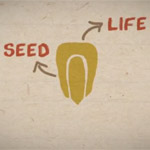
Seed markets are increasingly controlled by a few large companies, and intellectual property regimes that affect seeds are becoming stricter. This global phenomenon is being felt in Argentina, causing concern and debate.
The concentration of seed markets has consequences for biodiversity, food production and social justice. We are exploring how innovations like ‘open source’ seed systems could meet the needs of farmers and seed companies.
This work led directly to the creation of Bioleft, an open source initiative for seeds in Argentina.
- Video: Intellectual Property and Seeds, STEPS America Latina, November 2016
- Video: Taller de Transformación: Semillas y el futuro de la Argentina – short version, August 2017 (in Spanish)
- Video: Taller de Transformación: Semillas y el futuro de la Argentina – long version, August 2017 (in Spanish)
- Blog: Could new alliances for seeds in Argentina be a way to nurture agricultural diversity? Patrick van Zwanenberg, 2 May 2017
- Blog: BioLeft: experimenting with open source seed innovation in Argentina, Patrick van Zwanenberg and Anabel Marin, 6 June 2018
- Blog: Argentina’s ‘Bioleft’ project shares its first open source seeds, Patrick van Zwanenberg and Anabel Marin, 10 August 2018
- Video: Anabel Marin seminar on Bioleft at the Institute of Development Studies, February 2019
- Concept note: The future of seeds (and agriculture) in Argentina
- Blog: ‘Future of seeds’ workshop, Argentina, November 2014 (in Spanish)
China: The economic shock of a green transition in Hebei

China’s government is urgently pursuing a programme of ‘ecological modernisation’ that includes cutting carbon emissions and pollution. We are looking at how this has affected workers in the cement industry in Hebei Province, near Beijing, who have lost their jobs.
How could such transformations be better managed and responded to, considering these workers and others like them?
- Blog: Exploring the social impacts of green transformations in China, Jiang Chulin, 22 March 2017
- Blog: Winners and losers of China’s green transformation, Suzanne Fisher-Murray, 31 October 2016
- Concept note: Low-carbon energy transitions that meet the needs of the poor in China
- Workshop on low carbon transitions, China, December 2014 (event page)
India: Water and urban development
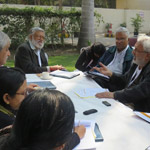 The Gurgaon region to the South-West of Delhi is undergoing a massive urban transformation under the influence of real estate driven processes of development of urban infrastructure and services.
The Gurgaon region to the South-West of Delhi is undergoing a massive urban transformation under the influence of real estate driven processes of development of urban infrastructure and services.
Planning, governance and practices for management of water supply do not take into account the growing inequities and unsustainable water management practices. What kind of public engagement will help create a more just and sustainable water management?
- Concept note: water, waste and sustainable cities in India
- Gurgaon Water Forum website
- Blog: The Power of a T-Lab: Sharing lessons on water and justice in Gurgaon, India Dinesh Abrol, Pravin Kushwaha and Bikramaditya K. Choudhary, September 2018
Kenya: Making mobile solar energy inclusive
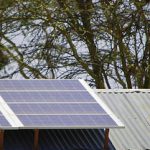
Solar power is gaining popularity as an off-grid source of energy for poor households and small businesses in Kenya. To help with the costs, people can now use a mobile phone-based payment system to access credits and pay for solar home systems over time. But the poorest households still struggle to afford it.
Our research is exploring how the mobile-enabled payments can be part of transformations in low-carbon energy systems that can benefit poor people.
- Blog: How can solar power be part of transformations to sustainability in Kenya? Joanes Atela, 27 March 2017
- Blog: How transformative are mobile payments for solar home systems in Kenya? Victoria Chengo and Kennedy Mbeva, September 2018
- Concept note: Africa – low carbon energy transitions
Mexico: wetlands under pressure
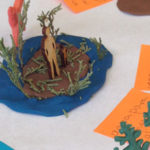
The ecosystem in the wetlands of Xochimilco, Mexico City faces competing pressures from rapid urban growth, tourism, farming and fishing.
There are many different views and visions of what should happen. We are exploring how to help people understand the different values and motivations involved, and look for innovative ways forward.
- Audio and slides: Mario Siqueiros seminar on the Mexico T-Lab, February 2019
- Blog: How rethinking local people’s agency could help navigate Xochimilco’s troubled waters, Rebecca Shelton, 2 May 2017
- Blog: A day in the Chinampas, Rebecca Shelton, 3 July 2017
- Blog: Mapping a transforming world in the Sierra Huichol, Mexico, Shiara González, Lakshmi Charli-Joseph, and Beth Tellman, 25 April 2018
- Blog: Creating bridges in Xochimilco through the “Pathways to Sustainability Game”, Beatriz Ruizpalacios, Lakshmi Charli-Joseph, Hallie Eakin, J. Mario Siqueiros-García, Rebecca Shelton, 29 October 2018
- Concept note: Water Governance Challenges, Mexico City and Phoenix
UK: Food systems in Brighton & Hove
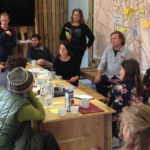
Brighton & Hove, a city on the south coast of the UK, has a population of around 275,000. How could small agro-ecological farmers nearby be supported in supplying the city and creating a more sustainable food system?
- Blog: Why local land matters for sustainable food systems, Rachael Taylor, 16 January 2017
- Endings and beginnings: project-based work within wider transformations, Adrian Ely and Elise Wach, 3 October 2018
- Concept note: Transformations to sustainable food systems in Brighton & Hove
Briefings
Informed by the T-Lab in Brighton, these briefings assess two key aspects of the local food system: how to link producers and markets for agro-ecological food; and the potential of nearby land to produce local, sustainable food.
- Market Linkage Strategies for Local Food Systems: Lessons for Brighton & Hove
Rachael Taylor, August 2018 - Brighton & Hove’s Farmland: Potentials for a more local and ecological food supply
Elise Wach and Adrian Ely, August 2018
Reports
- The Downland Estate: contributing to more sustainable food systems for Brighton and Hove
Workshop report, September 2018
Co-learning
Our programme involves six hubs, which work together to share insights on methods and learning. This takes place through project meetings and ‘exchange’ visits between three pairs of hubs.
The hubs are paired according to their work on common themes:
- Sustainable agricultural and food systems for healthy livelihoods – UK and Argentina
- Low carbon energy transitions that serve the needs of the poor – Kenya and China
- Waste and water for sustainable cities – India and Mexico
Events
Events where PATHWAYS Network members have shared their insights and joined together to discuss findings.
- IDS 50 (conference panel): Sustainability transformations: the intersecting roles of state, market and society
5 July 2016, Institute of Development Studies, UK - Webinar: Transformative Knowledge Networks – solutions-oriented research in practice (video + slides)
6 July 2016 - Presenting research at Resilience 2017 and Transformations 2017
August and September 2017 - Discussing transformations at the World Social Science Forum, October 2018
Co-Learning blog posts
The blog posts in this section reflect on the co-learning that has happened through the hubs working together, and with the other Transformative Knowledge Networks funded by the ISSC as part of the ‘Transformations to Sustainability’ programme.
- Living Aulas: what connects ‘undisciplinary’ research on sustainability? Almendra Cremaschi and Rebecca Shelton, 4 July 2018
- What ‘agency’ do researchers have in transformative research projects? Hallie Eakin, Lakshmi Charli-Joseph and J. Mario Siqueiros, 22 November 2017
- Seeding ideas: Knowledge brokering and recombination for agricultural transformations Adrian Ely, Paddy Van Zwanenberg, Elise Wach, Martin Obaya and Almendra Cremaschi, 20 November 2017
- Transformations from Beijing to Nairobi and back: what can we learn from each other? Yang Lichao, Kennedy Liti Mbeva and Jiang Chulin, 10 November 2017
- What does transformative research for sustainability look like? Patrick van Zwanenberg, Hallie Eakin, Ethemcan Turhan, Mutizwa Mukute and Fiona Marshall, 6 November 2017
- Research, convening and bridging: sharing insights from the ISSC’s Transformative Knowledge Networks, Adrian Ely, 13 June 2017
- Learning across continents on sustainable transformations: a visit from China to Africa, Yang Lichao, 19 May 2017
- Sharing insights across continents: Africa Sustainability Hub researcher visits China Hub, 1 December 2016
- How do we end the dominance of rich countries over sustainability science? Patrick van Zwanenberg, Anabel Marin and Adrian Ely, 19 January 2016
Go back to the PATHWAYS Network homepage.